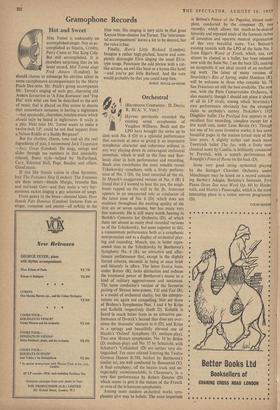Orchestral
ull A R, RCA; V, Vox.) (RECORDING COMPANIES : D, Decca; f" 10 HAVING previously recorded the J existing seven symphonies of Vaughan Williams, Boult and the LPO have brought the series up to date with No. 8 (D) in a splendid performance that succeeds at once in giving it an impressive symphonic character and coherence without in any way playing down its extravagant orchestral invention, which is well to the fore and flaw- lessly clear in both performance and recording. Boult also contributes the most notable recent Tchaikovsky symphony with a lively perform- ance of No. 3 (D), the least recorded of the six. In Munch's exaggerated version of No. 4 (R) I found that if I wanted to hear the pps, the neigh- bours rapped on the wall in the ffs. Ansermet appears in an unexpected role as conductor of the latest issue of No. 6 (D), which does not maintain throughout the exciting quality of the first six or seven minutes, but has many very fine moments. He is still more worth hearing in Bartdk's Concerto for Orchestra (D), of which there are almost as many rival recorded versions as of the Tchaikovsky, but none superior to this, a consummate performance both as a symphonic interpretation and as a display of orchestral play- ing and recording. Munch, too, is better repre- sented than in the Tchaikovsky by Beethoven's Symphony No. 6 (R), an attractive and affec- tionate performance that, except in the slightly forced scherzo, succeeds in being at once brisk and leisurely in effect. The latest Eroica issue, under Reiner (R), lacks distinction and reduces the emotional power of Beethoven's music to a kind of military aggressiveness and sentiment. The same conductor's version of the favourite pairing of Strauss tone-poems, Till and. Tod (R), is a model of orchestral clarity, but the interpre- tations are again not compelling. Nor are those of Brahms's Symphonies Nos. 1 and 4 by Krips and Kubelik respectively (both D). Kubelik is heard in much better form in an attractive per- formance of Dvorak's Second that does not over- stress the `dramatic' element in it (D), and Krips in a springy and beautifully phrased one of Haydn's `Oxford' Symphony (D, medium-play). Two new Mozart symphonies, No. 34 by Bohm (D, medium-play) and No. 35 by Schuricht, with Schubert's `Unfinished' (D) are neither very dis- tinguished. For more relaxed listening the Twelve German Dances K.586, backed by Beethoven's similar set, are well conducted by Remoortel (V). A final symphony, off the beaten track and un- expectedly recommendable, is Chausson's, in a very fine performance by Robert Denzler (D) which seems to give it the stature of the Franck or even of the Schumann symphonies.
Among more modern orchestral works sym- phonies give way to ballets. The most important is Britten's Prince of the Pagodas, almost com- plete, conducted by the composer (D, two records), which allows the much-to-be-desired leisurely and repeated study of the fantastic riches of invention and operatic musical organisation of this very beautiful score. Van Beinum's existing records with the LPO of the Suite No. 1 from Elgar's Wand of Youth, which, too, can almost be classed as a ballet, has been reissued now with the Suite No. 2 on the back (D), making an acceptable if not ideal record of an enchant- ing work. The latest of many versions of Stravinsky's Rite of Spring, under Monteux (R), will be welcome to those who consider his 78 San Francisco set still the best available. The nevi one, with the Paris Conservatoire Orchestra, is also masterly, though I should not place it ahead of all its LP rivals, among which Stravinsky's own performance obviously has the strongest claim to anybody's money. ProkOfiev's 1929 Diaghilev ballet The Prodigal Son appears in an excellent first recording, complete except for a few small cuts, under Leon Barzin (V). Though not one of his most inventive works, it has some beautiful pages in the mature lyrical style of his later years. A slightly earlier and much more Twentyish ballet The Jar, with a lively neo- classical score by Casella, is brilliantly conducted by Previtali, with a superb performance of Respighi's Pines of Rome on the back (D).
Some very good string orchestral playing by the Stuttgart Chamber Orchestra under Munchinger may be heard on a record contain- ing Barber's Adagio, Berkeley's Serenade, Five Pieces (from Das neue Werk Op. 44) by Hinde- mith, and Martin's Passacaglia, which is the most interesting piece in a rather uneven programme (D).
COLIN MASON






























 Previous page
Previous page